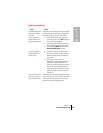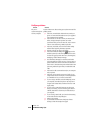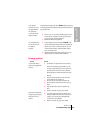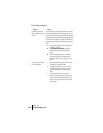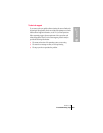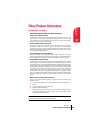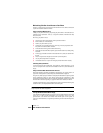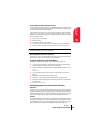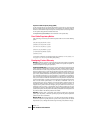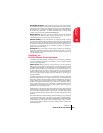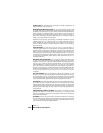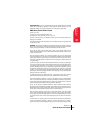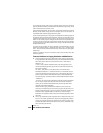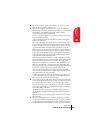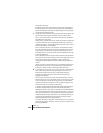
Section 11
Other Product Information 253
Other Product
Information
11
Turning Off Wireless Mode in Dangerous Areas
To avoid interfering with blasting operations, turn off wireless mode when in a blasting area or
in other areas with signs indicating two-way radios should be turned off. Construction crews often
use remote-control RF devices to set off explosives.
Turn off wireless mode when you're in any area that has a potentially explosive atmosphere.
Although it's rare, your phone and accessories could generate sparks. Sparks can cause an
explosion or fire, resulting in bodily injury or even death. These areas are often, but not always,
clearly marked. They include:
ᮣ Fueling areas such as gas stations.
ᮣ Below deck on boats.
ᮣ Fuel or chemical transfer or storage facilities.
ᮣ Areas where the air contains chemicals or particles such as grain, dust or metal powders.
ᮣ Any other area where you would normally be advised to turn off your vehicle’s engine.
Note: Never transport or store flammable gas, liquid or explosives in the compartment of
your vehicle that contains your phone or accessories.
Restricting Children’s Access to Your Phone
Your phone is not a toy. Do not allow children to play with it as they could hurt themselves and
others, damage the phone or make calls that increase your phone bill.
Caring for and Protecting Your Phone Battery
The guidelines listed below help you get the most out of your battery’s performance.
ᮣ Use only Sprint-approved chargers. These chargers are designed to maximize battery life.
Using other chargers voids your warranty and may cause damage.
ᮣ In order to avoid damage, charge the battery only in temperatures that range from 32º F to
113º F
(0º C to 45º C).
ᮣ Don’t use the battery charger in direct sunlight or in high humidity areas, such as the
bathroom.
ᮣ Keep the metal contacts on the bottom of the phone clean.
ᮣ The battery may need recharging if it has not been used for a long period of time.
ᮣ Don’t store the battery in high temperature areas for long periods of time. It’s best to follow
these storage rules:
ᮣ 32º F to 122º F (0º C to 50º C)
Acknowledging Special Precautions and the FCC Notice
FCC Notice
This phone may cause TV or radio interference if used in close proximity to receiving equipment.
The FCC can require you to stop using the phone if such interference cannot be eliminated.
Vehicles using liquefied petroleum gas (propane or butane) must comply with the National Fire
Protection Standard (NFPA-58). For a copy of this standard, contact the National Fire Protections
Association, One Batterymarch Park, Quincy, MA 02269, Attn: Publication Sales Division.
Cautions
Any changes or modifications to your phone not expressly approved in this document could void
your warranty for this equipment and void your authority to operate this equipment. Only use
approved batteries, antennas, and chargers. Although your phone is quite sturdy, it is a complex
piece of equipment and can be broken. Avoid dropping, hitting, bending or sitting on it.



